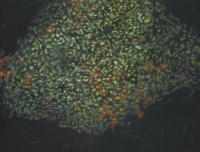Neurology Scans
 Human embryonic stem cells. Image: NIH
Human embryonic stem cells. Image: NIH
This scan includes briefs on future funding for the NIH, Geron’s stem cells business competitor, new guidelines for diagnosing neuropathy, a problematic epilepsy drug up for approval, and FDA warnings about a psoriasis drug
The Society for Neuroscience (SfN) urges Senate to include $10 billion for NIH in economic recovery plan Support increased federal funding for scientific research? The SfN says that as early as today, Sen. Arlen Specter (R-PA) will offer an amendment that would include $10 billion for the National Institutes of Health in the economic stimulus package. The SfN has a call out to researchers and citizens who support increasing federal research funds to contact their senators and urge them to vote “yes” on the amendment when it is presented on the Senate floor. SfN’s online Legislative Action Center has the details and a contact form. Geron FDA approval prompts comment from competitor It was big news from the science pages to the business pages when the Food and Drug Administration (FDA) authorized Geron Corp. of Menlo Park, Calif., to test whether stem cells are safe for use in spinal injury patients since it cleared the way for the first human clinical trials of human embryonic stem cell research. The announcement prompted Geron biotech competitor International Stem Cell Corporation (ISCO), Oceanside, Calif., to issue a statement that said its own process solves outlying “moral dilemmas” and patient immune rejection issues. ISCO said it owns the only other source of pluripotent stem cells suitable for transplants today, “one that has distinct competitive advantages,” said Kenneth C. Aldrich, ISCO’s chairman and CEO, and a venture capitalist. He said his company’s proprietary parthenogenesis process can generate pluripotent human stem cell lines from unfertilized human eggs. ISCO scientists also have created the first parthenogenetic homozygous stem cell line (phSC-Hhom-4) that can generate therapeutic cells that will not be immune rejected after transplantation into millions of individuals of different age, sex and race, according to the statement. “The FDA’s approval of Geron clinical trials marks an enormous step forward for the field of stem cell research and clears the way toward ISCO to hopefully begin human trials by the end of the year,” said Aldrich. FDA issues warning about life-threatening infections in psoriasis patients treated with Raptiva (efalizumab) The FDA has received reports of serious infections in patients treated with Raptiva, an immunosuppressant approved as a once a week injection to treat adult patients with moderate to severe plaque psoriasis. According to FDA Patient Safety News, some cases have lead to hospitalization and death. Studies in mice suggest that repeated use of Raptiva in pediatric patients could lead to permanent suppression of the immune system. A new boxed warning “will highlight the risk of bacterial sepsis, viral meningitis, invasive fungal disease, progressive multifocal leukoencephalopathy (PML) and other opportunistic infections,” according to the FDA. The FDA is also requiring the drug manufacturer, Genentech Inc., to include the warnings on medication guides distributed to patients who are prescribed the drug. Plaque psoriasis is the most common for of psoriasis. It can be genetic and is believed to be caused by an immune disorder. Psoriasis can be exacerbated by smoking, sun exposure and alcohol abuse. New guidelines for neuropathy issued The American Academy of Neurology released a new evidence-based practice guideline for diagnosing distal symmetric polyneuropathy (DSP), also known as neuropathy or neuritis, the most common variety of neuropathy. A patient fact sheet on the disorder and a summary of the guidelines are available. Diabetes is the most common cause of DSP but other causes are alcohol abuse, poor nutrition, genetics and allergic disorders. FDA considers problematic epilepsy drug
Contemporary Pediatrics reported that the FDA’s advisory committee on neurology medications was poised to approve an investigational epilepsy drug despite results that showed vigabatrin (Sabril), made by Ovation Pharma, affected peripheral vision in adults and children. Ovation has been in trials since the 1980s as an adjunctive therapy to treat seizures in adults and infantile spasms in children. A study of 500 children and adults with refractory partial epilepsy showed that while reducing seizures in both populations, vigabatrin caused a peripheral visual field defect in 25% of adults and 15% of children. The risk of developing the visual defect is dose- and frequency-related and continue even after the patient stops using the drug, according to an FDA committee briefing document. If approved, vigabatrin would be the only FDA approved medication to treat infantile seizures.



 del.icio.us
del.icio.us Digg
Digg












Post your comment